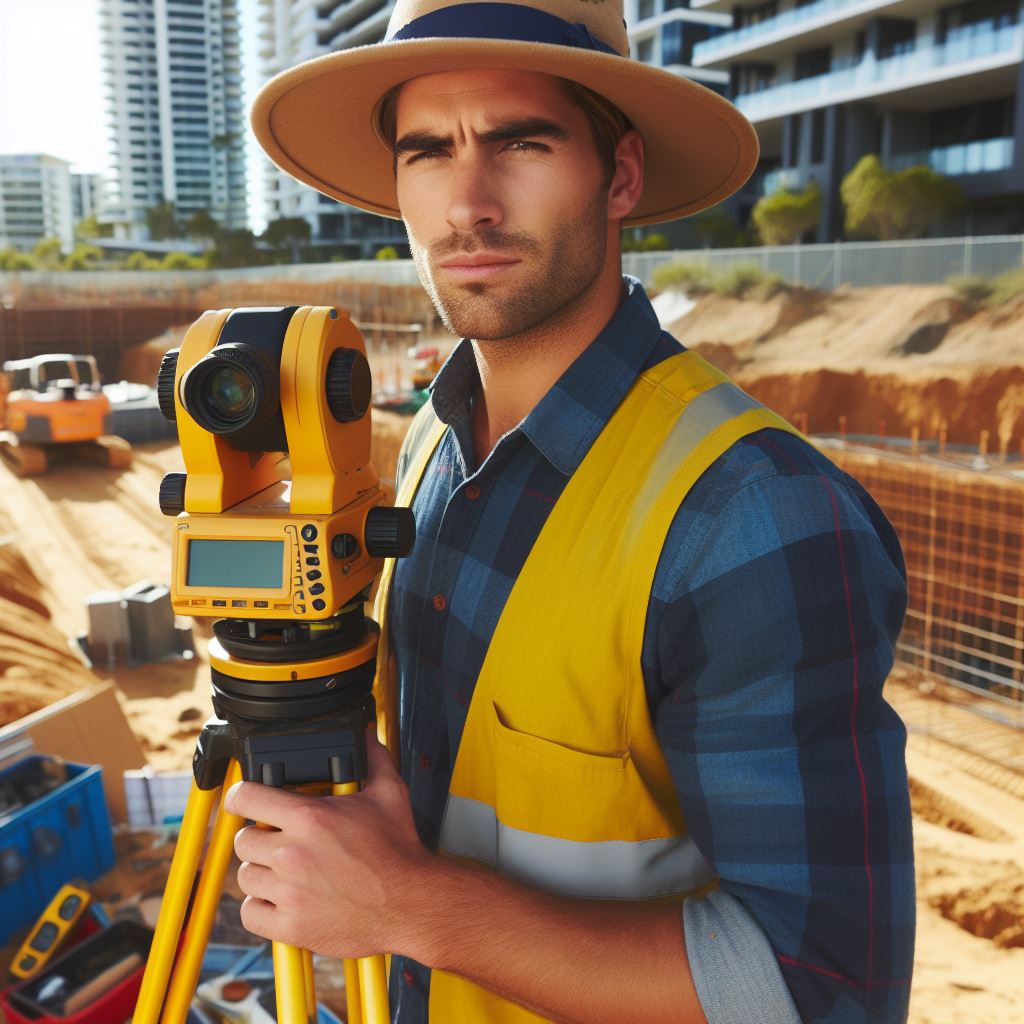Introduction
Within the construction industry, the role of surveyors stands as a linchpin, orchestrating crucial tasks that are fundamental to the success and integrity of construction projects.
Surveyors play a multifaceted role, extending beyond conventional land surveying, and their contributions are integral to the entire project life cycle.
At the heart of their responsibilities lies the paramount task of ensuring accurate measurements.
Precision in measurement is the cornerstone upon which the foundation of any construction project is laid.
Surveyors meticulously map out the terrain, assess boundaries, and determine elevations, providing essential data that informs every subsequent construction decision.
Moreover, surveyors are guardians of proper construction practices.
Their expertise is invaluable in the planning phase, where they assess the feasibility of construction on a given site, taking into account topographical nuances and potential challenges.
During the execution phase, surveyors play a critical role in layout and site preparation, ensuring that construction aligns seamlessly with the specified plans and adheres to regulatory requirements.
Beyond their involvement in the physical aspects of construction, surveyors are essential for quality assurance.
They scrutinize and validate the accuracy of project components, ranging from structural elements to infrastructure, contributing to the overall reliability and safety of the built environment.
In review, surveyors serve as the bedrock of precision in construction projects.
They meticulously attend to details, utilizing a deep spatial data understanding to surpass expectations in accuracy, efficiency, and sustainability while meeting regulatory standards.
As we delve deeper into the realm of construction, the indispensable role of surveyors becomes increasingly evident, underscoring their significance in shaping the built environment.
Role of Surveyors in Construction
A. Definition and overview
Surveyors play a pivotal role in the construction process, contributing significantly to the various stages of a project.
Their multifaceted responsibilities encompass site preparation, initial assessments, mapping, boundary establishment, and the provision of critical elevation and topographic data.
B. Surveyors are essential in site preparation and initial assessments
In the realm of site preparation, surveyors are instrumental in conducting thorough assessments to evaluate the terrain’s suitability for construction.
They meticulously analyze the landscape, taking into account factors such as soil composition, slope, and drainage patterns.
This initial phase sets the foundation for informed decision-making throughout the construction process.
C. Involvement in creating accurate maps and plans
One of the primary responsibilities of surveyors lies in creating accurate maps and plans tailored to the unique requirements of construction projects.
Armed with a comprehensive understanding of spatial data, surveyors ensure that these documents not only adhere to regulatory standards but also exceed expectations in terms of accuracy, efficiency, and long-term sustainability.
Their meticulous attention to detail is paramount in crafting maps that serve as crucial guides for the construction team.
D. Surveyors’ duties in setting boundaries and determining property lines
Setting boundaries and determining property lines are fundamental tasks that fall within the purview of surveyors.
By leveraging their expertise in land measurement and legal principles, surveyors establish clear demarcations, preventing disputes and ensuring that construction activities adhere to designated areas.
This aspect of their role contributes significantly to the smooth progress of construction projects and fosters a legal framework for property use.
E. Role in providing elevation data and topographic information
Moreover, surveyors play a vital role in providing elevation data and topographic information.
This involves measuring and documenting the elevation changes across the construction site, which is indispensable for designing structures that align with the natural contours of the land.
Accurate topographic information enables architects and engineers to make informed decisions about the placement of infrastructure, optimizing construction efficiency and minimizing environmental impact.
In essence, surveyors act as integral contributors to the success of construction projects, combining their expertise in spatial data with meticulous attention to detail.
From the initial site assessments to the establishment of boundaries and the provision of crucial elevation and topographic data, surveyors play a pivotal role in shaping the landscape of construction endeavors.
Read: Surveying 101: An Aussie’s Intro to the Field
Importance of Surveyors in the Construction Industry
A. The significance of accurate measurements and data in construction projects
Accurate measurements and data are crucial for the success of any construction project. Without precise measurements, construction projects can face numerous complications and delays.
Surveyors play a crucial role in ensuring accurate measurements and data collection. They use advanced tools and techniques to measure and record the dimensions and topography of the construction site.
By conducting detailed surveys and measurements, surveyors provide accurate information about the land’s features, such as slopes, elevations, and boundaries.
This data is critical for architects, engineers, and other construction professionals to make informed decisions during the design and planning phases.
B. Surveyors ensure proper alignment and positioning of structures
Additionally, surveyors ensure proper alignment and positioning of structures within the construction site.
They work closely with architects and engineers to establish the optimal locations for buildings and infrastructure.
Surveyors use their expertise to measure and mark the positions where foundations, walls, and other structural elements should be placed.
Through meticulous precision and attention to detail, surveyors contribute to the successful execution of construction projects.
Your Personalized Career Strategy
Unlock your potential with tailored career consulting. Get clear, actionable steps designed for your success. Start now!
Get StartedC. The role of surveyors in preventing errors and minimizing rework
One of the significant roles of surveyors is to prevent errors and minimize rework in construction projects.
By conducting thorough surveys and measurements, they identify and rectify potential discrepancies before construction begins.
This helps avoid costly mistakes and redesigns, saving both time and money for the construction company.
D. Surveyors contribute to the overall safety and efficiency of construction projects
In addition to accuracy, surveyors also play a crucial role in ensuring the safety and efficiency of construction projects.
They conduct detailed site inspections to identify any potential hazards, such as unstable soil or geological anomalies.
Based on their findings, surveyors advise construction teams on how to mitigate risks and implement safety measures to protect workers and the surrounding environment.
E. The importance of surveyors’ involvement in compliance with regulations and legal requirements
Moreover, surveyors monitor construction works to ensure that structures are built in compliance with regulations and legal requirements.
They verify that the construction project adheres to zoning regulations, building codes, and other relevant legislation.
Surveyors collaborate with local authorities and other stakeholders to ensure that the project meets the necessary standards and obtains the required permits and approvals.
In fact, surveyors play a crucial role in the construction industry. Their work is vital for accurate measurements, proper alignment of structures, error prevention, and ensuring compliance with regulations.
By providing accurate data and maintaining the overall safety and efficiency of construction projects, surveyors contribute significantly to the success of the industry.
Read: Historic Preservation in Australian Architecture
Challenges Faced by Surveyors in Construction
A. Potential Obstacles and Challenges
In their role, surveyors encounter various obstacles and challenges that can hinder their work efficiency and accuracy.
B. Limitations Associated with Site Conditions and Environmental Factors
The site conditions and environmental factors can pose limitations to surveyors’ ability to conduct accurate measurements.
Stand Out with a Resume That Gets Results
Your career is worth more than a generic template. Let us craft a resume and cover letter that showcase your unique strengths and help you secure that dream job.
Get HiredFactors like heavy vegetation, extreme weather conditions, or difficult terrains can obscure visibility or affect equipment performance.
C. Difficulty in Obtaining Accurate Measurements in Complex and Challenging Terrains
Surveyors face significant challenges when it comes to obtaining accurate measurements in complex and challenging terrains.
Steep slopes, uneven ground surfaces, or tight spaces can make it difficult to position instruments and gather precise data.
D. Impact of Technological Advancements on Surveying Practices
The continuous development of technology has had a significant impact on surveying practices in the construction industry.
While technological advancements have improved efficiency and accuracy, they also come with their own challenges for surveyors.
Adapting to new software, learning how to use advanced equipment, and ensuring data integrity can be demanding tasks for surveyors.
Furthermore, there can be a learning curve for older surveyors who need to adapt to new technologies.
Surveyors working in the Australian construction industry face various challenges in their role.
These challenges involve potential obstacles, limitations from site conditions and environmental factors, difficulties in measuring complex terrains, and adapting to technological advancements.
However, despite these challenges, surveyors play a crucial role in ensuring accurate measurements and providing valuable data for construction projects in Australia.
Read: Challenges Faced by Modern Architects

The Future of Surveying in Construction
Emerging technologies and innovations in surveying are revolutionizing the construction industry.
From drones to laser scanning and GPS technologies, these advancements have the potential to greatly enhance construction surveys.
A. Drones: A Game-Changer in Construction Surveys
One of the most significant technological breakthroughs in surveying is the use of drones.
These unmanned aerial vehicles have the ability to capture precise, high-resolution images and data from a bird’s-eye view.
Transform Your LinkedIn for Maximum Impact
Elevate your professional brand with a LinkedIn profile that attracts recruiters, showcases your expertise, and maximizes opportunities. Stand out in your industry with a profile built for success.
Boost Profile- Drones can quickly and efficiently survey large areas, reducing surveying time and costs.
- They can reach inaccessible or hazardous locations, eliminating the need for human surveyors to enter dangerous environments.
- The captured data can be transformed into 3D models, providing accurate information for designing and planning construction projects.
B. Laser Scanning: Revolutionizing Accuracy and Efficiency
Laser scanning technology has also played a crucial role in advancing construction surveys.
By emitting laser beams and measuring their reflection, laser scanners generate detailed point cloud data, ensuring precise measurements and accurate representations of existing structures.
- Laser scanning significantly reduces human error in measurements, improving the overall accuracy of surveys.
- It enables faster data collection, allowing surveyors to complete surveys more efficiently.
- The collected data can be used for clash detection, ensuring that new construction aligns perfectly with existing structures.
C. GPS Technologies: Enhancing Accuracy and Productivity
Global Positioning System (GPS) technologies have become an integral part of modern construction surveys.
With the use of GPS receivers, surveyors can accurately determine their position and collect data that is geographically referenced.
- GPS technologies enable real-time positioning, allowing surveyors to verify their measurements on site.
- They provide highly accurate data, eliminating the need for manual measurements.
- GPS can be combined with other technologies, such as drones and laser scanners, to enhance data collection and analysis.
D. Continuous Learning and Upskilling: A Key to Success
As technology continues to evolve, it is crucial for surveyors to embrace continuous learning and upskilling.
Staying updated with the latest advancements in surveying techniques and technologies will be essential for their professional growth and success.
- Attending workshops, seminars, and conferences can provide surveyors with insights into emerging technologies and best practices.
- Acquiring certifications in new surveying technologies will enhance their expertise and marketability.
- Collaborating with other professionals in the industry can foster knowledge exchange and help stay at the forefront of the field.
E. Evolving Surveying Practices to Meet Future Demands
Surveying practices must continuously evolve and adapt to meet the demands of the future construction industry.
Here are some potential ways in which surveying may change:
- Increased integration of artificial intelligence and machine learning algorithms for data analysis and interpretation.
- Advancements in robotic surveying equipment and autonomous vehicles for more efficient and accurate data collection.
- The use of augmented reality and virtual reality tools for visualizing and simulating construction projects.
- Enhanced collaboration and data sharing through cloud-based platforms for seamless communication among all stakeholders.
- Improved sustainability practices through the incorporation of environmental monitoring sensors in surveys.
In short, the future of surveying in construction holds immense potential due to emerging technologies and continuous learning.
By embracing these innovations and adapting to evolving industry demands, surveyors can play a pivotal role in shaping the future of construction.
Read: Architecture Licensing in Australia Explained
You Might Also Like: Engineering Drafting: Qualifications in Australia
Conclusion
Surveyors play a crucial role in the construction industry in Australia. They ensure accuracy, safety, and compliance in construction projects, which are essential for successful outcomes.
Collaboration between surveyors and other construction professionals is necessary to achieve these goals.
By providing precise measurements and expertise, surveyors ensure that construction projects are built according to the design plans and specifications.
They play a critical role in minimizing errors and preventing costly rework during construction.
Moreover, surveyors contribute to the safety of construction sites by identifying potential hazards, such as unstable ground conditions or underground utilities.
Their expertise helps in proper planning and execution of construction activities, ensuring the safety of workers and the general public.
Compliance with regulations and standards is another important aspect that surveyors oversee.
They ensure that the construction projects adhere to building codes, zoning laws, and other legal requirements.
This promotes the quality and integrity of the built environment. Successful project outcomes heavily rely on the collaboration between surveyors and other construction professionals.
From architects and engineers to contractors and project managers, everyone needs to work together seamlessly.
Effective communication and coordination among these stakeholders are essential for smooth project execution and timely completion.
In the end, surveyors are essential in the Australian construction industry. Their role in ensuring accuracy, safety, and compliance cannot be underestimated.
Collaboration and teamwork among surveyors and other construction professionals are vital for achieving successful project outcomes.




